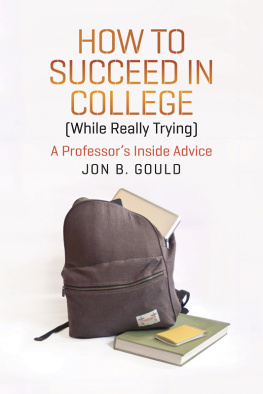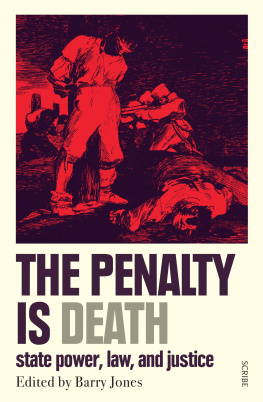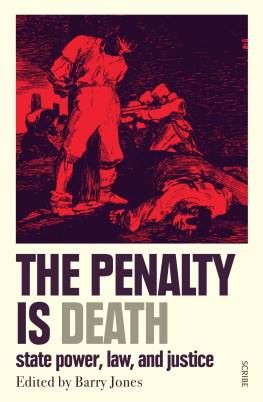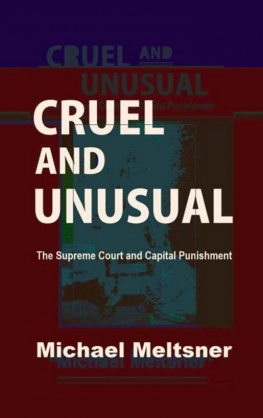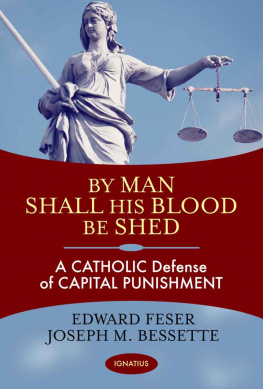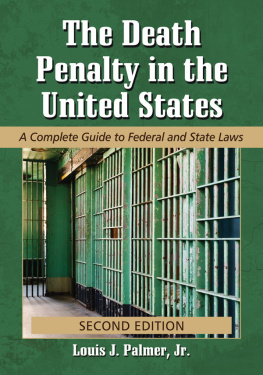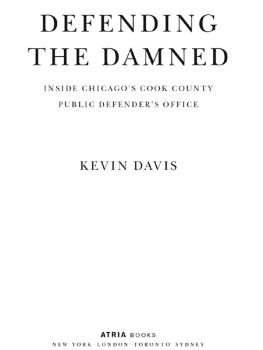NEW YORK UNIVERSITY PRESS
New York
www.nyupress.org
2019 by New York University
All rights reserved
References to Internet websites (URLs) were accurate at the time of writing. Neither the author nor New York University Press is responsible for URLs that may have expired or changed since the manuscript was prepared.
Library of Congress Cataloging-in-Publication Data
Names: Gould, Jon B., author. | Barak, Maya Pagni, author.
Title: Capital defense : inside the lives of Americas death penalty / Lawyers, Jon B. Gould and Maya Pagni Barak.
Description: New York : New York Unviersity Press, 2019. | Includes bibliographical references and index.
Identifiers: LCCN 2018026987 | ISBN 9781479873753 (cl : alk. paper)
Subjects: LCSH : Capital punishmentUnited States. | Defense (Criminal procedure)United States.
Classification: LCC KF9227.C2 G685 2019 | DDC 364.660973dc23
LC record available at https://lccn.loc.gov/2018026987
New York University Press books are printed on acid-free paper, and their binding materials are chosen for strength and durability. We strive to use environmentally responsible suppliers and materials to the greatest extent possible in publishing our books.
Manufactured in the United States of America
10 9 8 7 6 5 4 3 2 1
Also available as an ebook
On April 15, 2013, Dzhokhar and Tamerlan Tsarnaev became instantly infamous when their homemade bombs exploded at the finish line of the Boston Marathon, killing three and wounding more than 260. Four days later, Tamerlan was dead and Dzhokhar was in custody, the latters arrest eventually leading to a lengthy and well-publicized trial. It would be difficult to have lived through this period and not recognize the Tsarnaev brothers. But what of Judy Clarke? Hardly a household name, Clarke was Dzhokhar Tsarnaevs lead attorney in the federal trial that ended in his death sentence. That verdict was rare for Clarke, who has succeeded in sparing many other notorious defendants execution. Her roster of former clients includes Unabomber Theodore Kaczynski, the Atlanta Olympics bomber Eric Rudolph, Arizona assassin Jared Lee Loughner, and Susan Smith, the South Carolina mother who strapped her two young children into car seats and rolled the vehicle into a lake, killing them both. In each of those cases, Clarkes clients remain alive, albeit sentenced to life in prison.
Those who know her call Ms. Clarke one of the nations best capital defense lawyers, the proverbial ace in the hole, and yet she assiduously avoids press attention. The few profiles of Clarke describe her as modest, unassuming, and reticent to draw attention to herself.
It might be tempting to see Clarke as an exception among capital defense lawyers. To be sure, she has handled a remarkable number of notorious cases, and her record at sentencing is outstanding. But the depiction of Clarke as a kind of hermit savant misunderstands the nature of capital defense. By and large, the best lawyers in Clarkes field avoid press coverage, choosing instead to go about their professional lives with a low profile. Its not simply because the work they do is unpopular. Certainly, many people consider their clients to be the worst of the worst, criminals whose ghastly deeds may justify execution. Yet, to hear the lawyers describe their lives, few have faced serious harassment for the work they do. There is the occasional letter or comment in passingperhaps even an amateurish crank phone call at homebut these seem to be the exceptions, even for advocates who stand before the public and argue on behalf of defendants who are alleged to have killed many.
So, if its not the threats or concerns for their own safety or reputation that silence capital defense lawyers, what keeps them quiet? Their reticence is rooted in a greater, almost Hippocratic notion of professionalismto do no further harm to the client. There is no good to be gained by talking to the media, says one such lawyer, nothing I can say that will get a reporter to cover my client like we need. Besides, explains another attorney, Im not the story. This case isnt about me. If I ever forget that, if I ever step out front and accept the spotlight, Id be letting ego get the better of me. Thats not what I do. Were here to serve those who need us, not advance ourselves.
The result is that capital defense attorneys end up hiding in plain sight. Handling the most notorious cases, seen on television walking to and from court, rendered in a courtroom artists sketch while arguing at a trial, we can identify their faces and may recognize their names, yet we know next to nothing about them. Why, for example, do they perform this work? What are the challenges of the position, and how do lawyers handle the incredible stresses of a job where failure is quite literally a matter of life and death? Some lawyers must even be witnesses to that failuretheir clients execution. How can someone work on anothers behalf for months, sometimes years, watch him die, and then go back to the office to take on another case?
It is unfathomable. Or at least it seemed unfathomable to us until we started talking to capital defense lawyers. Over the course of two years, we interviewed more than sixty capital defense lawyers and some of their staff. From Virginia to California, from Texas to New York, our research took us across the country, talking to attorneys in state and federal courts, at the start and near the end of distinguished careers, in firms big and small and in public defenders offices, too. The one commonality was that the lawyers had handled death penalty cases at the trial stage, where verdicts either take death off the table or put clients on the conveyer belt toward execution.
We are far from nave about the criminal justice system, and in fact, one of us has more than a decade of experience studying capital cases. We number several capital defense lawyers among our friends. Still, it was remarkable how anxious defenders were in speaking to us. Some joked that the practice is like a cult at times, its members fearful of letting anyone in who might even inadvertently share their thinking, allowing it to reach the hands of a prosecutor who would use the inside information to convict and sentence one of their clients to death. Caution is understandable when the stakes are so high, but there is a lot to be gained by opening up the world of capital defense for examination. Not only can we explore the attorneys motives and professional challenges, but even more, it gives us a window into the gravest corner of the U.S. criminal justice system: the workings of the death penalty. The United States is among a minority of countries in the world, and arguably one of only two developed, democratic nations, that has executed a defendant in recent times.American lawyers, would voluntarily accept. As one capital defender explained, To many people, were seen as the garbage collectors of the law. Who would want to do this dirty job?
How Can You Represent These People?
Yet they do it, thus raising one of the most central questions for this bookwhat motivates someone to make a career out of defending some of the worst killers in the country? Its a question that gets asked of criminal defense attorneys in generalphrased often as How can you represent those people?but the stakes are undoubtedly higher when the lawyer is handling a death penalty case. Some attorneys have sought to answer this question in print, but their accounts are typically specialized and limited. By contrast, we find multiple motivations. Perhaps the easiest to understand is zealous opposition to the death penalty. With few exceptions, each of the capital defense lawyers we interviewed opposes the death penalty in all cases. For some, though, the mission is even greater. As one attorney explained, One of my jobs is to get the human rights world to see my clients as victims of systemic human rights violations. Many of these lawyers are driven by a religious zeal, seeing the task of preventing state-sponsored killing as akin to a moral crusade. I just felt called, said an earnest young attorney. Im somewhat of a religious person, and I felt very much called by this work.


